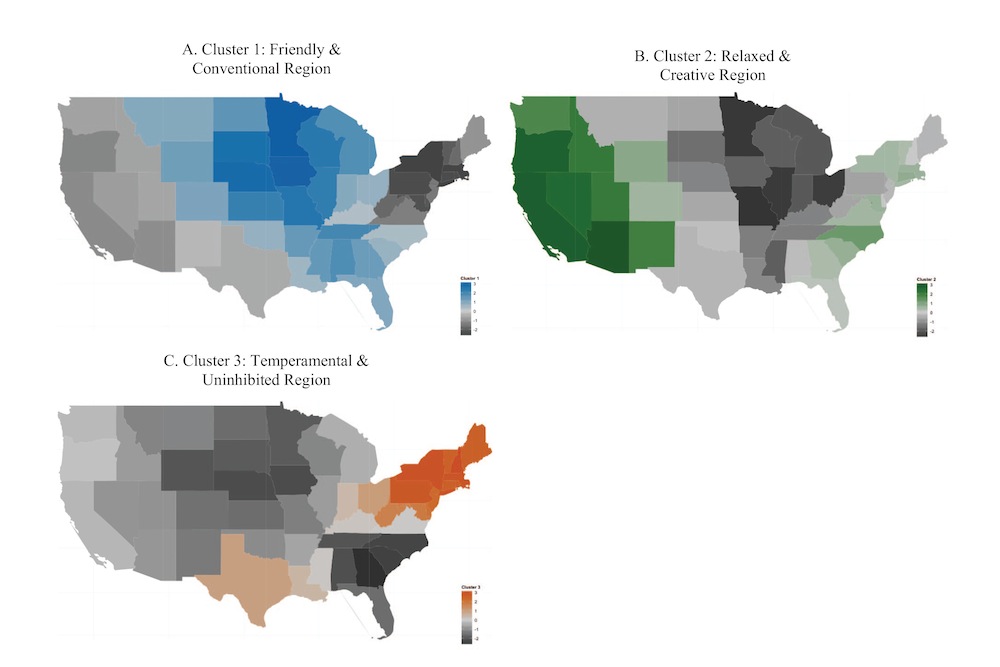Most Neurotic & Creative States Revealed in US Personality Map

Stereotypes about friendly Southerners and creative West Coasters are at least partially true, according to new research that maps out the personality of each region in the United States.
The study, published online Oct. 14 in the Journal of Personality and Social Psychology, divides up the country by psychological traits, specifically what psychologists call the Big Five: openness to experience, extroversion, agreeableness, conscientiousness and neuroticism. The result is a map comprising three new "regions": the friendly and conventional South and Midwest, the creative and relaxed East and West coasts, and the temperamental, uninhibited Northeast and Mid-Atlantic.
"This analysis challenges the standard methods of dividing up the country on the basis of economic factors, voting patterns, cultural stereotypes or geography that appear to have become ingrained in the way people think about the United States," study researcher Peter J. Rentfrow, a psychologist at the University of Cambridge in the U.K., said in a statement. "At the same time, it reinforces some of the traditional beliefs that some areas of the country are friendlier than others, while some are more creative." [7 Personality Traits That Are Bad For You]
Mapping personality
Rentfrow and his colleagues measured personality on a state level. They used five samples of people, collected online as part of other psychological projects, and in one case via a Facebook app called MyPersonality. The participants in all five samples filled out questionnaires that ranked them on the Big Five personality domains. An extrovert, for example, will love socializing, and a neurotic person will often feel anxious. Conscientious people are careful and responsible, and agreeable people are friendly and warm. People who are open to new experiences are willing to try new things.
With data from hundreds of thousands of participants across the continental United States, the researchers calculated an average value for each personality trait for each state. The values can be compared within states, to show that, for example, Tennesseans are more extroverted than New Yorkers, on average. By looking for patterns in which traits appear together, the researchers then divided up the U.S. map into personality regions. The data reflected the actual gender and ethnic breakdown of the population, though young people were overrepresented. [See the List of States with Personality Rankings]
Local flavor
Get the world’s most fascinating discoveries delivered straight to your inbox.
The South and Midwest, the researchers found, are both high in extroversion, agreeableness and conscientiousness, with low levels of neuroticism and openness. This constellation of traits led the psychologists to declare this area of the country "friendly and conventional."
Meanwhile, along the East and West coasts, people tended to be low in extroversion and agreeableness, average in conscientiousness and very low in neuroticism. They were extremely high in openness, however — apparently, that relaxed, try-anything California vibe is no myth.
"The image depicted by this profile represents a region of people who are, on average, creative and relaxed, reserved and perhaps somewhat socially distant," the researchers wrote, labeling this region "relaxed and creative."
Finally, the New England and Mid-Atlantic region rated slightly low in extroversion, low in agreeableness, low in conscientiousness, very high in neuroticism and slightly above-average in openness. The researchers thus dubbed this region "temperamental and uninhibited," noting that people in the area are "on average, irritable, impulsive and quarrelsome."
Certain demographic factors were related to a region's personality. The friendly and conventional states were less affluent, less educated and less innovative, with higher numbers of political conservatives and Protestants than other regions. Friendly and conventional states were also the least healthy in the country.
The relaxed and creative states were more ethnically diverse, wealthier, more educated and more innovative than other regions — no surprise, considering this region includes hotbeds of development such as California's Silicon Valley.
Finally, the temperamental and uninhibited states have older populations than other regions do and are higher in wealth and lean politically liberal, the research found.
Selective migration may explain many of these patterns, Rentfrow and his colleagues suggested. People low in openness, for example, may not travel far from home, settling near friends and establishing a concentration of like-minded and tight-knit groups in the South and Midwest. In contrast, lots of open-minded people move to the relaxed and creative states for job opportunities, creating a tolerant and individualistic mecca. The Northeast and Mid-Atlantic seem marked by an outflow of population, suggesting that those who stay behind are less open and more neurotic.
Follow Stephanie Pappas on Twitter and Google+. Follow us @livescience, Facebook & Google+. Original article on LiveScience.

Stephanie Pappas is a contributing writer for Live Science, covering topics ranging from geoscience to archaeology to the human brain and behavior. She was previously a senior writer for Live Science but is now a freelancer based in Denver, Colorado, and regularly contributes to Scientific American and The Monitor, the monthly magazine of the American Psychological Association. Stephanie received a bachelor's degree in psychology from the University of South Carolina and a graduate certificate in science communication from the University of California, Santa Cruz.
